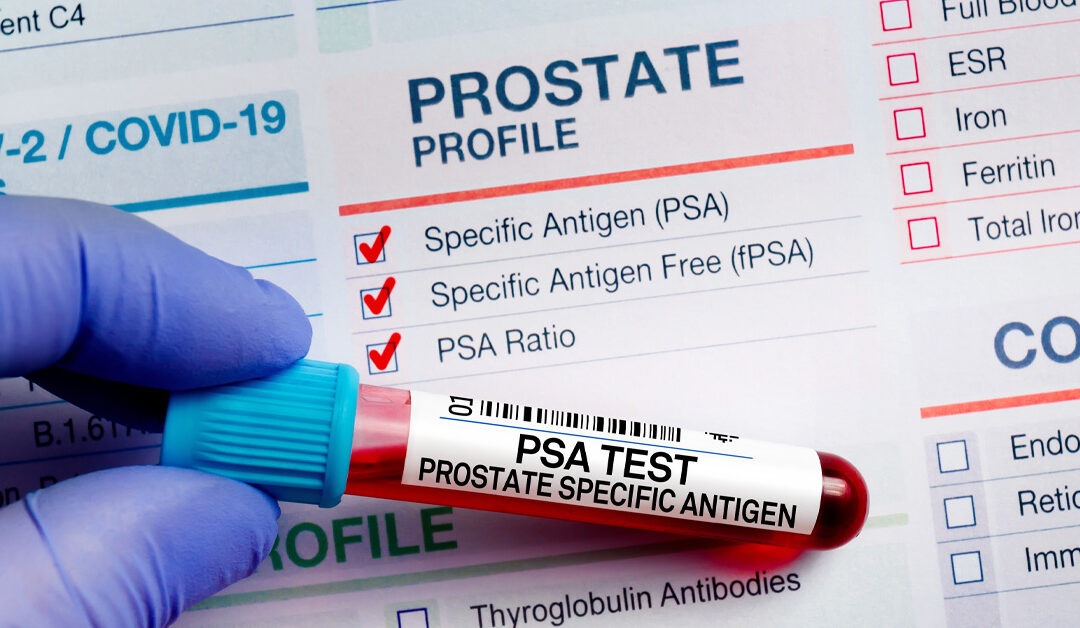As men get older, it’s important to begin prostate cancer screening, which often includes getting a PSA test. Many men start by asking, “What is a PSA test?” And why does it matter?
What is a PSA Test?
A PSA test helps find prostate problems. PSA, which stands for prostate-specific antigen, is a protein made by both normal and abnormal cells in the prostate gland. It is mostly found in semen, with only a small amount entering the bloodstream.
A PSA test is a simple laboratory blood test that measures how much of this protein is circulating in your blood. Higher levels can signal changes in the prostate, including cancer, inflammation, and enlargement.
Why Do Doctors Use the PSA Test?
The PSA test is primarily used to screen for prostate cancer and to monitor prostate health over time. It can sometimes detect early changes before symptoms appear, allowing treatment to begin sooner if needed.
Your doctor may recommend a PSA test if you:
- Are between 50 and 69 years old and want to check for prostate cancer as part of routine screening.
- Are 40 to 45 years old with higher risk factors, such as a family history of prostate cancer.
- Have urinary symptoms that may suggest prostate problems, such as a weak urine stream or frequent nighttime urination.
- Are being monitored after prostate cancer treatment to check for recurrence.
PSA levels can rise for reasons unrelated to cancer. That’s why it’s important to interpret the results within the full picture of your health history and any other findings.
How Is the Test Done?
A small blood sample is taken from your arm and sent to a lab. You don’t need to fast beforehand, but your doctor might give you a few preparation tips:
- Avoid ejaculation or vigorous exercise, like cycling, for 24 to 48 hours before your test, as these can temporarily raise PSA levels.
- Tell your doctor about any medications or supplements you take, especially those for prostate symptoms.
What Level of PSA is Considered Elevated?
Younger men tend to have lower PSA values, while older men may have slightly higher ones naturally. Results are measured in nanograms per milliliter (ng/mL). In general, PSA levels are as follows:
- Age 60 or older: should be at or below 4.0 ng/mL
- Age 59 or younger: should be at or below 2.5 ng/mL
The average PSA for men in the younger group is <1.0 ng/mL.
What is normal varies with age, prostate size, and other health factors. Rather than focusing on one number, doctors look for trends over time. For example, they’ll monitor whether your PSA is rising steadily or suddenly.
What Can Affect PSA Levels?
Several noncancerous conditions and everyday factors can raise PSA levels, such as:
- Benign prostatic hyperplasia (BPH), a common enlargement of the prostate that comes with age
- Prostatitis, or inflammation of the prostate, sometimes caused by infection
- Recent ejaculation or intense physical activity
- Recent medical procedures, such as cystoscopy or catheter placement
Some PSA-lowering medications can also make levels appear lower than they actually are. Because of these fluctuations, doctors rarely rely on a single test result.
What Do My Results Mean?
A high PSA result doesn’t automatically mean cancer, and a normal result doesn’t always rule it out. If your PSA is higher than expected, your doctor may:
- Repeat the test to confirm the result and see whether it’s trending upward
- Perform a digital rectal exam (DRE) to feel for lumps or firmness in the prostate
- Order imaging, or additional tests that account for prostate size, or track how quickly your PSA is changing
These additional evaluations help determine whether a biopsy is necessary.
- PSA testing can:
- Provide a baseline for future comparisons as you age
- Detect prostate cancer early
- Help to monitor prostate cancer treatment or detect recurrence after surgery or radiation
A high number doesn’t always mean cancer, and a low number doesn’t guarantee you’re in the clear. What matters most is context, including:
- Your age
- Symptoms
- Family history
- How your results change over time
Get Started with Prostate Cancer Screening
The PSA test is a valuable window into prostate health, but it’s not a diagnosis by itself. Get started with prostate cancer screening in the greater Eugene-Springfield area with the experienced urologists at Oregon Urology Institute.
Still wondering “what is a PSA test?” and if it’s time for you to get one? Don’t delay – call (541) 334-3350 to schedule an appointment today!



